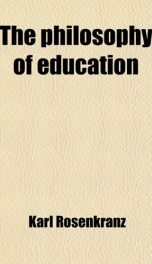the philosophy of education

Purchase of this book includes free trial access to www.million-books.com where you can read more than a million books for free. This is an OCR edition with typos. Excerpt from book: [Education deals altogether with the formation of habits. For it aims to make some condition or form of activity into a second nature for the pupil. But this involves, also, the breaking up of previous habits. This power to break up habits, as well as to form them, is necessary to the freedom of the individual.] § 34. Education comprehends, therefore, the reciprocal action of the opposites: authority and obedience; rationality and individuality; work and play; habit and spontaneity. If these are reconciled in a normal manner, the youth is now free from the tension of these opposites. But a failure in education in this particular is very possible through the freedom of the pupil, through special circumstances, or through the errors of the educator himself. And for this very reason any theory of education must take into account in the beginning this negative possibility. It must consider beforehand the dangers which threaten the pupil, in all possible ways even before they surround him, and fortify him against them. Intentionally to expose him to temptation in order to prove his strength, is devilish; and, on the other hand, to guard him against the possible chance of dangerous temptation, to wrap him in cotton (as the proverb says), is womanish, ridiculous, fruitless, and much more dangerous; for temptation comes not alone from without, but quite as often from within, and secret inclination seeks and creates for itself the opportunity for its gratification, often perhaps an unnatural one. The truly preventive activity consists not in an abstract seclusion from the world, all of whose elements are innate in each individual, but in the activity of instruction and discipline, modified according to age and culture. The method that aims to deprive the youth of all free and individ...
Info about the book
Author:
Series:
Unknown
ASIN:
B008FTNLIQ
Rating:
4/5 (3)Your rating:
0/5
Languge:
English
Users who have this book
Users who want this book
What readers are saying
What do you think? Write your own comment on this book!
write a commentGenre
if you like the philosophy of education try:
Other books by this author
Do you want to exchange books? It’s EASY!
Get registered and find other users who want to give their favourite books to good hands!


